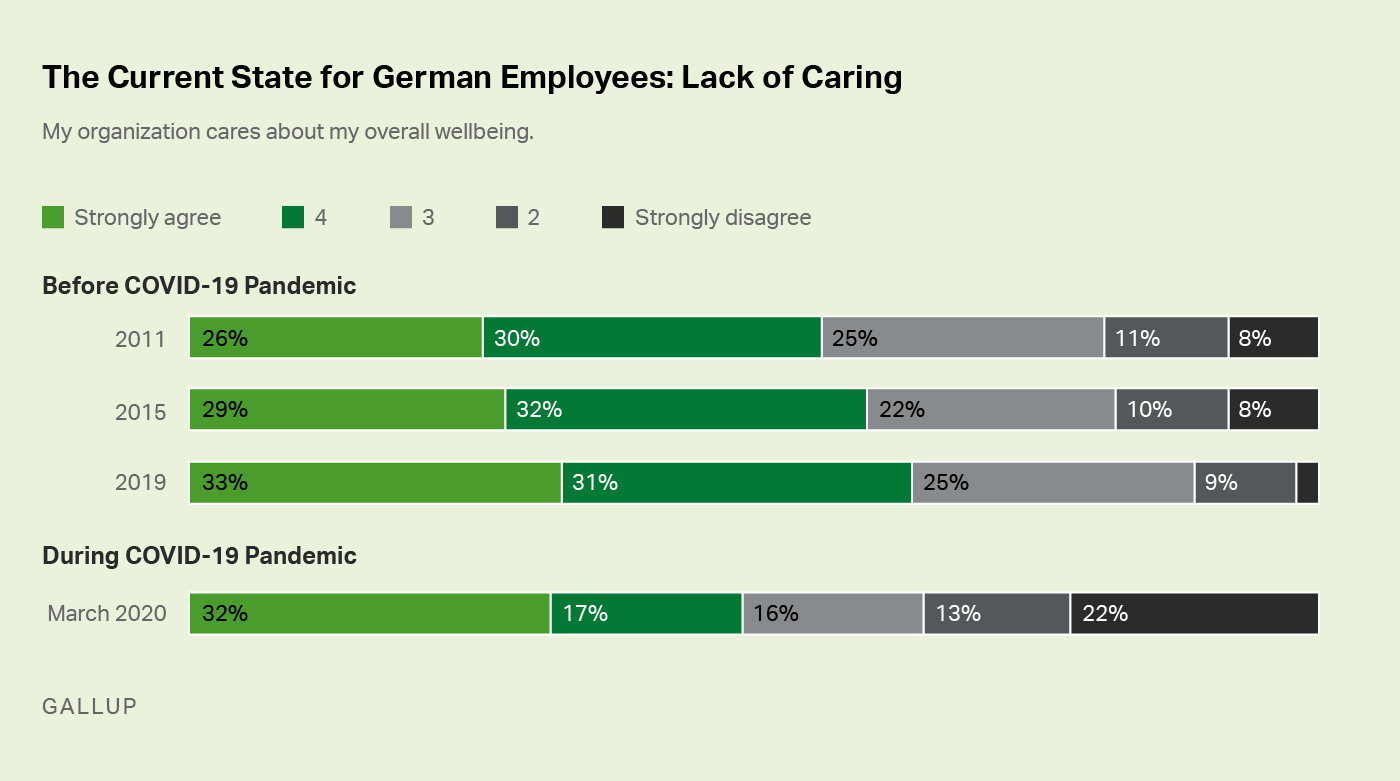Story Highlights
- Fewer German employees now say employer cares about their wellbeing
- Employees who feel their company cares about wellbeing perform better
- Leaders can make wellbeing programs relevant to current conditions
German employees' belief that their employer cares about their overall wellbeing has fallen since the arrival of COVID-19, and it's a growing concern for German business leaders -- not least because wellbeing is so strongly associated with productivity.
A 2016 Gallup study found that 54% of German employees who strongly agreed that their company cares about their wellbeing -- as evidenced by a rating of "5" on a 1-to-5 scale -- also strongly agreed that their working environment helps them be productive.
But when that rating dropped to a "4," their perception of a productive work environment fell to 26%.
And when Gallup asked German employees how strongly they agreed that their company is interested in their "general wellbeing" and about how many days they missed last year because they "felt sick or not good," the analysis showed that employees who doubted their employer's interest in their wellbeing missed an average of 7.2 days per year.*
Those who felt their wellbeing was very important to their company only missed 4.9 days.
That 2.3-day difference cost their company an average of about 655 euros ($777) per person. In a 1,000-employee company, that loss totals around 400,000 euros ($474,000) a year.
And that math only calculates the cost of absences -- the data show that even when employees come to work, they say they're less productive if they believe their company is disinterested in employee wellbeing.
Gallup research also shows workers' perspective has a positive impact on business results.
For example, employees who strongly agree that their company is interested in their general wellbeing (a rating of "5") report significantly less stress, exhaustion and burnout than do those who give a "1," "2" or "3" response.
The more that employees believe their company cares about their overall wellbeing, the more positive, fit and productive they report feeling.
| Felt stressed yesterday | Felt tired or burned out yesterday | Had anxiety or depression in past year | Felt good and positive mood yesterday | Felt fit and productive yesterday | ||||||||||||||||||||||||||||||||||||||||||||||||||||||||||||||||||||||||||||||||||||||||||||||||
|---|---|---|---|---|---|---|---|---|---|---|---|---|---|---|---|---|---|---|---|---|---|---|---|---|---|---|---|---|---|---|---|---|---|---|---|---|---|---|---|---|---|---|---|---|---|---|---|---|---|---|---|---|---|---|---|---|---|---|---|---|---|---|---|---|---|---|---|---|---|---|---|---|---|---|---|---|---|---|---|---|---|---|---|---|---|---|---|---|---|---|---|---|---|---|---|---|---|---|---|---|
| % Yes | % Yes | % Yes | % Yes | % Yes | ||||||||||||||||||||||||||||||||||||||||||||||||||||||||||||||||||||||||||||||||||||||||||||||||
| My company is interested in my general wellbeing: | ||||||||||||||||||||||||||||||||||||||||||||||||||||||||||||||||||||||||||||||||||||||||||||||||||||
| Strongly agree (5) | 20 | 15 | 5 | 92 | 93 | |||||||||||||||||||||||||||||||||||||||||||||||||||||||||||||||||||||||||||||||||||||||||||||||
| Rating of 4 | 26 | 17 | 14 | 83 | 88 | |||||||||||||||||||||||||||||||||||||||||||||||||||||||||||||||||||||||||||||||||||||||||||||||
| Rating of 1, 2 or 3 | 43 | 37 | 16 | 71 | 74 | |||||||||||||||||||||||||||||||||||||||||||||||||||||||||||||||||||||||||||||||||||||||||||||||
| Gallup | ||||||||||||||||||||||||||||||||||||||||||||||||||||||||||||||||||||||||||||||||||||||||||||||||||||
Employees' diminished confidence that their leaders care is especially disappointing because before the coronavirus outbreak, the proportion who strongly agreed that their company cares about their overall wellbeing was increasing year over year -- reaching 33% in 2019, with fewer strongly disagreeing.
But since the pandemic, German confidence has waned, and now 35% disagree that their employer cares about their wellbeing -- a 24-percentage-point increase. Obviously, that's a trend that companies need to reverse.

Leaders should start by making their wellbeing programs and actions relevant to current conditions. A wellbeing audit will give them a holistic view of countries, locations, divisions, segments, functions and workgroups, illuminating trouble spots and best practices that others can learn from.
Concurrent with that, leaders need to expand the scope of responsibility for wellbeing, to include:
- A wellbeing action committee: This team could coordinate and communicate activities and initiatives, provide advice and guidance to managers and employees, offer webinars about different wellbeing-related topics -- such as money management (planning, budget, spending, financial literacy), health (cooking, mindfulness, yoga) or childcare (online homeschooling, family activities) -- and provide a platform for weekly messaging to employees.
- Managers: The best managers have frequent conversations with employees, but managers need to make wellbeing a part of those conversations. Actively listening to the frustrations and concerns of employees is a good habit -- but so is compassionate questioning. Questions like "How is your family coping with the situation? What aspects of your wellbeing have felt the most impact right now? What is contributing to that impact?" are supportive and individualized -- and they demonstrate that the manager genuinely cares about employees and their wellbeing.
- A review of HR programs and enlisting local resources: Mental health and job development initiatives may need to be reprioritized, and policies, incentives, recognition, virtual events and development programs may need to be reformulated to fit current problems.
The wellbeing needs of in-house employees will differ from those of remote workers -- especially regarding ongoing childcare issues -- and the wellbeing program should be tailored to employees' specific needs.
Leaders may find that local wellbeing resources are exceptionally useful, as they tend to be flexible and individualized to each community. In any case, corporate programs should be thoroughly communicated -- employees may not know they exist or may not understand the material benefits they offer.
But they do need to know that leadership cares enough to encourage their use.
The pandemic is temporary, but the effects of wellbeing on productivity are not. They're not confined to Germany, either.
Gallup finds that only 27% of employees in the U.K. and 26% in France strongly agree that their company cares about their wellbeing. That will compromise European businesses' ability to rebound from this disaster.
Employees who are confident that their leaders care, however, can pull their companies through difficult times. More resilient, more energetic and more productive, they'll create a more profitable future -- and a far less worrisome present.
Learn whether your employees are thriving, struggling or suffering:
- Partner with Gallup to identify areas where your employees' wellbeing may be at risk.
- Explore our resources on wellbeing and see why thriving employees perform better.
*This analysis did not take into account long-term illness resulting in 90 or more days of absence per year.





